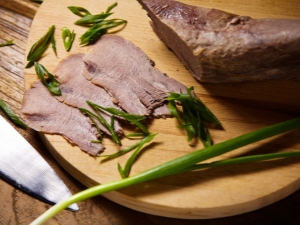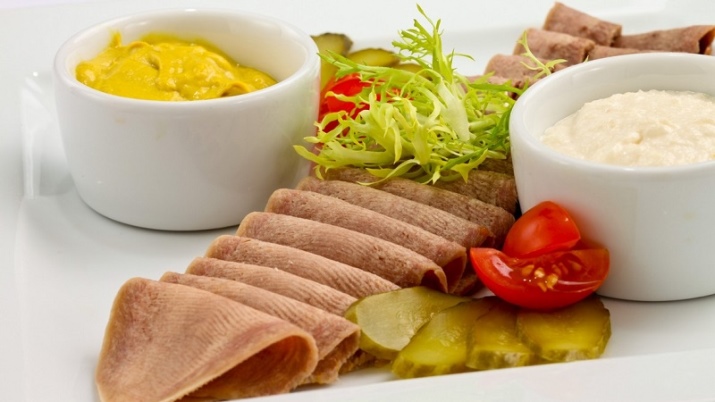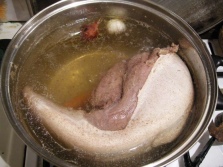The benefits and harms of beef tongue

Beef tongue is considered a delicacy for its delicate taste. However, in addition to gastronomic pleasure, the use of this dish will also be beneficial to health. In the article, we will consider what is the chemical composition of the delicacy, and how it affects the human body.
Chemical composition
Physiologically speaking, beef tongue is a sheathed muscle tissue. Beef meat is divided into 3 classes, and the tongue, along with the liver, heart, brains and kidneys, are called first class offal.
Before selling, fat, lymphatic and connective tissues are removed from the tongue. The weight of the product can vary from 200 grams to 2 kg.

Beef tongue is rich in fat, however this healthy fatty acids and low cholesterol, that's why the dish is considered dietary. In addition, the by-product contains a large amount of protein, essential and non-essential acids necessary for the construction of muscles, cells and enzymes, as well as the production of collagen.
The calorie content of the dish is 173 kilocalories per 100 grams. Most of the composition, 16%, is occupied by proteins, 12% are carbohydrates and 2.2% are fats.
The chemical composition of the product is presented B vitamins, tocopherol (vitamin E), vitamin PP. As far as minerals are concerned, the first thing to note is high iron content. It is no coincidence that this offal is prescribed for anemia, and is also recommended for the prevention of the disease.
Also in the language there are potassium and magnesium, calcium, phosphorus, chromium, zinc, copper. Due to the presence of connective tissue, this dish is well absorbed, including all the vitamins and minerals contained in the delicacy.


Beneficial features
The saturation of the composition of the language allows it to strengthen the human body, promotes recovery after illness. Easy absorption and a high concentration of proteins in the composition make the tongue useful for people who have increased physical activity involved in sports, as well as to improve the growth and development of children, recovery from exhaustion, diseases, injuries. A rather high content of zinc contributes to the rapid healing of wounds.
The high content of B vitamins makes beef tongue useful for the hematopoietic system. The level of hemoglobin, blood quality increases, the likelihood of developing congestion in the vessels decreases.
And also vitamin B has a positive effect on the functioning of the nervous system - the conductivity of nerve impulses improves, the resistance of the nervous system to stress, symptoms of chronic fatigue increases. This dish is recommended for nervous exhaustion, fatigue, as well as increased intellectual stress. Thanks to the combination of phosphorus and B vitamins, it is possible to improve mental activity - increase blood supply to the brain, concentration, improve memory.


Due to the low glycemic index, this by-product is allowed for type 2 diabetes. Moreover, the use of offal helps in the production of insulin, so the tongue not only does not increase, but also reduces blood glucose levels.
High concentration in the tongue of zinc - 100 grams of by-product covers up to 20% of the body's daily need for this element.It ensures the functioning of sex hormones, the pituitary gland. There is so much nicotinic acid (vitamin PP) in the tongue that a portion of 100 grams “closes” up to 40% of the daily requirement of the human body for this mineral.
The benefit of this delicacy for women is the ability to improve tissue regeneration, increase collagen synthesis, and calm the nervous system. For men, the tongue is useful for building muscle mass, getting maximum energy, which is especially valuable for those who play sports or experience other increased physical activity.
The boiled tongue provides the greatest value and almost unchanged composition. The broth can be given to people at the stage of recovery from serious illnesses. Its usefulness far exceeds the healing properties of chicken broth.

Contraindications
The use of beef tongue should be abandoned in case of individual intolerance to this product. Elderly people should reduce the amount of food consumed, as it puts a greater burden on the liver and kidneys. However, even middle-aged people with problems with these organs should use the language with caution.
Contraindications to the use of beef tongue are asthma, serious diseases of the respiratory system, thyroid gland. It is necessary to exclude offal in case of allergic rhinitis.
By-products contain a large amount of purines, which makes them a forbidden dish for gout and joint problems. Because of the cholesterol in the composition, the use of the delicacy should also be abandoned in case of atherosclerosis, vascular diseases.
Finally, it is important to cook the dish correctly, because if the cooking technology is violated, the dense film is not digested.It harms the digestive organs.


Hypoallergenic or not?
Beef tongue cannot be called a hypoallergenic product. It can provoke an allergy, although the development of such reactions is an infrequent phenomenon. And also the tongue is contraindicated for people who have an individual intolerance to meat dishes.
With poor digestion of the dish, the load on the liver and kidneys increases, which, in turn, reduces immunity. It should not be consumed by people with protein intolerance, since there is quite a lot of it in the composition of the tongue. Of course, this is not an allergy to the tongue in the truest sense of the word, but the result of such a tasting can hardly be called useful and pleasant.

Features of use
It is important to use quality products. The first proof of quality is the availability of certificates and veterinary certificates from the seller. The fresh product has a purple hue, while the pink color of the tongue is a sign of repeated freezing and thawing of the product. A gray coating on the offal indicates its staleness. Unlike other types of offal, fresh tongue does not have a specific smell, but is characterized by a meaty smell.
Finally, it is worth remembering that beef tongue is a perishable product. After buying it, it is better to immediately divide it into parts and freeze in order to cook exactly as much as you can eat. However, during defrosting, some of the nutrients are destroyed. Repeated freezing of the product is unacceptable. In finished form, the tongue is stored in the refrigerator. no more than 2-3 days.
The cooking technology involves pre-soaking the tongue in cold water for an hour. Then the tongue is cleaned and washed, after which it is dipped in cold water and brought to a boil.The first broth is recommended to be drained - it has a high cholesterol content. But the broth of the second cooking is useful, it can be given to emaciated, seriously ill people. The cooking time of the tongue varies from 2 to 4 hours.
For pregnant and lactating women, beef tongue is especially beneficial. The use of a delicacy for various diseases is a controversial issue. Consider the features of the use of dishes for certain ailments or at different periods of life in more detail.



During pregnancy
Beef tongue during pregnancy is an easy-to-digest source of protein and amino acids. During the period of bearing a baby, a woman often suffers from anemia. However, in most cases, it is possible to increase the level of hemoglobin in a short time.
The folic acid contained in the composition of the dish is necessary for the formation of the nervous system, tissues and organs of the child. And for the expectant mother, B vitamins will not be superfluous, since they have a positive effect on the nervous system. A woman during this period is subject to stress and increased emotional stress.
However, beef tongue should not be included in the menu from the first days of pregnancy, this is fraught with future allergies in the child. The best option - starting from the 15th week of pregnancy, use the tongue 1-2 times a week. The daily dose is 200 grams.
Naturally, the product is allowed only if there are no contraindications.

When breastfeeding
The beef tongue will give energy to a nursing mother and provide the body exhausted by pregnancy, childbirth and lactation with useful minerals and vitamins. During the feeding period, a new mother may also experience a decrease in hemoglobin levels, so beef tongue will increase the level of red blood cells in the blood.
Thanks to B vitamins, it is possible to support the nervous system of a woman, who can also be exhausted by anxiety, physical and moral fatigue, and postpartum depression.
Since this delicacy is easily digestible and does not burden the intestines, this also makes it useful during lactation, since during this period the organs of the gastrointestinal tract of a woman can still be quite “problematic”. First of all, women suffering from constipation will be able to note a positive effect, because thanks to the fibers in the composition, the tongue has a delicate laxative effect.
The product also has a positive effect on lactation, increasing the energy value of milk, eliminating its possible bitterness. However, one must not forget that this offal provokes allergies, so it should be included in the diet of a nursing mother no earlier than 3 months after birth.

For kids
Rich in proteins and amino acids, beef tongue is recommended for children during the growth period. The delicacy helps to strengthen the immune system, build up the baby's muscle corset, and provides it with energy. Due to the high content of iron in the composition, with regular use, it is possible to avoid anemia. Calcium in the composition helps to strengthen the skeletal system, and phosphorus in combination with vitamin B guarantees the timely development of the brain. In addition, vitamin B is necessary for the functioning of the nervous system of children, improving the conduction of nerve impulses. Beef tongue should be introduced into the child's diet no earlier than 8-10 months. Moreover, first the baby must learn to eat and digest meat (choose dietary chicken, turkey, rabbit). Only after that you can treat him with an offal.
Beef tongue should be cleaned and boiled, then passed through a meat grinder or blender, diluted with a small amount of boiled water for a lighter consistency. First, let the baby try the resulting puree in the amount of a third of a teaspoon. In the absence of an allergic reaction, increase the rate to half, and then a whole spoon. By the year, the daily dosage can be 2-3 tablespoons of the product. You can give it no more than 1-2 times a week.
When introducing beef tongue, it is important to follow the general rules for introducing a new dish:
- start with small doses, increasing them only in the absence of allergic reactions and digestive disorders;
- introduce only one product, you can not combine several new dishes at once;
- give your child a new meal in the morning.

When dieting
The low amount of fat, high content of easily digestible protein and relatively low calorie content make it possible to include language in the menu of those who seek to reduce weight. Rich in vitamins and minerals, the tongue helps to avoid their deficiency in the body, which often occurs when following diets, especially strict ones. Vitamin B contained in the delicacy is involved in metabolic and lipid processes. In addition, it will support the nervous system, which is also experiencing serious stress when dieting.
Changing the habitual diet often provokes irritation of the gastric mucosa, and in more severe cases even causes gastritis. The tongue does not burden digestion, it is quickly and easily digested, and prevents inflammation of the gastric mucosa.
The most useful for losing weight will be boiled tongue with a minimum amount of salt. You can eat it already in this form or combine with vegetables, add to salads, combine with side dishes, weak meat or vegetable broths.
You can replace chicken or beef with this offal in the recipe.

For diseases
Due to the presence of fats and cholesterol in the tongue, it will have to be excluded from the diet for diseases such as cholecystitis, pancreatitis, as well as for liver pathologies, atherosclerosis and high blood cholesterol.
During an exacerbation of gastritis and peptic ulcer, the delicacy should be excluded from the patient's menu. However, at the stage of persistent remission, moderate consumption of beef tongue will help you gain strength and recover faster. During this period, boiled tongue is allowed; in the first stages of remission, it is better to use it finely chopped or mashed.
With diabetes, the tongue is a permitted product. It is likely that with type 1 disease, an adjustment in the amount of insulin administered will be required. In any case, consultation with the attending physician is desirable. The daily dose for a diabetic is 100-120 grams.

See below for details.












